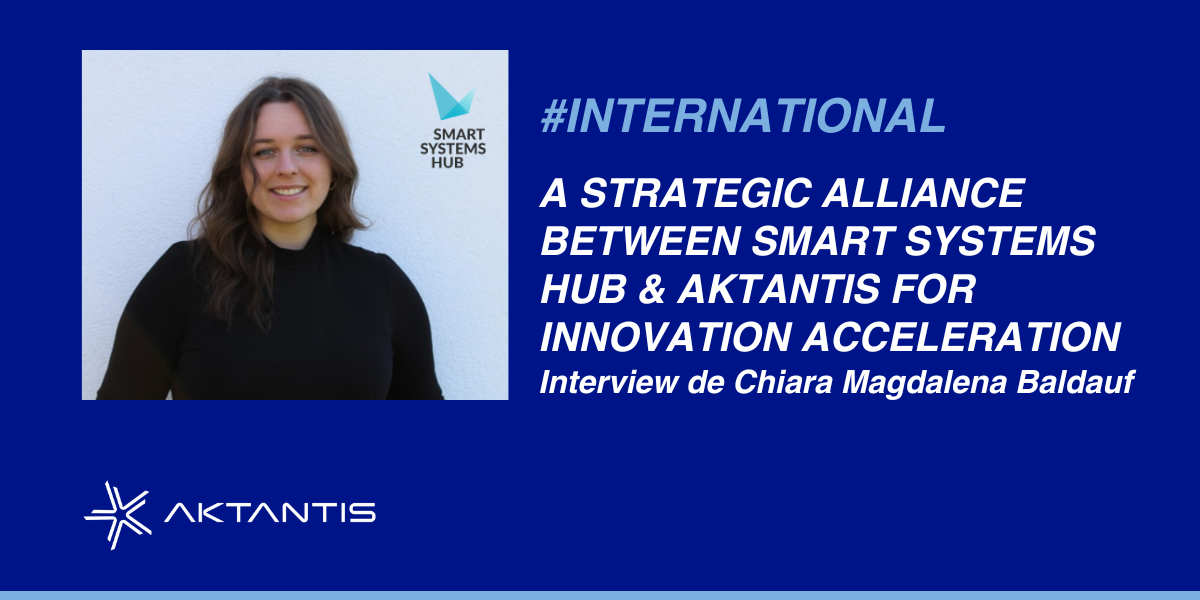Chiara Magdalena Baldauf is Head of partner management at Smart Systems Hub Dresden. This role includes the coordination and strategic orientation of our national and international partner activities, as well as our event activities and sales. Focus on the collaboration between Smart Systems Hub Dresden and AKTANTIS.
Could you describe the Smart Systems Hub (mission, areas of expertise, partners & ecosystem, types of actions)?
The Smart Systems Hub is part of the Germany-wide Excellence Initiative (Digital Hub Initiative) of the German Federal Ministry for Economic Affairs and Climate Action (BMWK) and Europe’s largest co-innovation center in the field of industrial automation.
In the heart of the microelectronics in the middle of Europe, the Hub combines comprehensive expertise in the areas of software, hardware and connectivity in a vital network of over 700 partners – including key partners such as SAP, ZEISS, Telekom MMS and GlobalFoundries.
The aim of our work is to accelerate innovations in the industrial environment and to bring leading technologies of Industry 4.0 into application. To this end, the hub provides its customers with access to reference solutions and technologies (Inno:Lab). In addition, the hub creates spaces for cooperation between industry partners, startups and SMEs and develops concepts, prototypes, first product versions (MVPs) and viable business models in a methodically guided co-innovation process in a maximum of three months.
How is the manufacturing sector evolving in terms of the adoption and impact of smart systems (globally and in your country/region)?
The manufacturing industry, just like the other industries, is affected by advancing digitalization and automatization. Topics such as sustainability, connectivity and agility play an important role in this. Various software solutions, robotics and AI offer opportunities to become more efficient and faster. Smart systems can help companies to react more quickly to changing environmental requirements, to produce more sustainably and to create better networking within companies and along supply chains. Further, they can help to bring different aspects like sustainability and connectivity together. To conclude smart systems are getting even more important for companies on the market to stay competitive, globally as well as in our region.
What are the key challenges and opportunities you see for this evolution in the near future and what role does Smart Systems Hub play in addressing these challenges and capitalising on these opportunities?
With its large network of partners, the Smart Systems Hub supports bringing together the relevant players such as research institutes, SME ́s and startups and offering innovative, fast and efficient solutions in the field of smart systems for various use cases. The focus is primarily on speed, which can keep up with the rapid developments in the industry and supports the agility of the companies. Furthermore, the development of solutions with our partner network offers the opportunity to draw on current knowledge from research and the latest technologies from the startup world. In this way, we create unique synergies for our customers and partners.
Why did AKTANTIS and Smart Systems Hub come together? Why is it essential to build this type of collaboration?
In the globalized world it is essential to share knowledge also across borders and work together to be fast and innovative. Because Aktantis covers a lot of expertise regarding industrial automation it was an important step for us to build up a strong partnership with you. Further, the network power Aktantis helps us to get in touch with important players in this field in western Europe.
AKTANTIS has recently joined the hub:stations network, which you coordinate. Could you describe this initiative (objectives, actions, partners, opportunities, …)?
The hub:stations initiative is a global network of physical spaces that reflect the structure of modern supply chains in manufacturing – distributed across Germany, Europe, and the world.
Just as manufacturing today relies on seamless global collaboration, our hub:stations serve as focal points for co-innovation, enabling organizations to develop, test, and implement cutting-edge solutions together. By linking these physical locations with the Open Smart Systems Hub community, we are creating an open, distributed ecosystem that transcends geographic boundaries and fosters innovation on an international scale.
Our network brings together companies, developers, researchers, and innovators who share a common goal: driving the future of industrial automation through co-innovation. With AKTANTIS now joining this movement, we are expanding our reach and strengthening the connections that make groundbreaking advancements possible. We are excited about the opportunities this partnership will unlock – from shared resources and expertise to new avenues.
We are now seven hub:stations with different focus topics, which can be linked to the future of manufacturing. Five of them are located in Germany, one in eastern Europe and one in western Europe. The network will continue to grow steadily and add new important nodes for innovation to the community.
How do you envision the future of the collaboration between Smart Systems Hub and AKTANTIS? What could our next joint actions be?
Our vision is to share our network power and expertises to shape the future of manufacturing together through joint projects, events and visibility.
One example of a project together, we are doing with our Open Smart Systems Hub Community, is the Global Thin[gk]athon in June 2025 regarding the topic Manufacturing-X. The Global Thin[gk]athon is all about pushing the boundaries of industrial automation through co-innovation. This unique event takes place simultaneously at various locations around the world, where we test and validate real-world use cases using the Smart Systems Hub’s Manufacturing-X Testbed. By collaborating with our international network of partners, we explore feasibility, identify potential, and work towards implementing groundbreaking solutions for the industry.
At the heart of this year’s challenge is a fundamental question: How can we create an open and interconnected platform for industry, and how can we make the best use of shared data? This is where Manufacturing-X comes in – an initiative that aims to harness data-driven collaboration to enhance resilience, sustainability, and trust in industrial ecosystems. During the Thin[gk]athon, participants will explore key aspects of Manufacturing-X.
